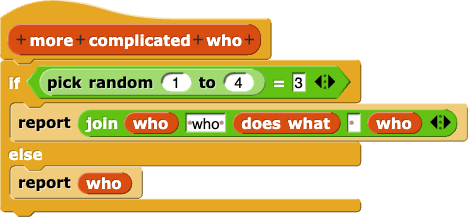- If it isn't open already, open your U1L2-Gossip project.
- Find
 in the red Lists palette, drag it into the scripting area, and click on it enough times to see how it's different from
in the red Lists palette, drag it into the scripting area, and click on it enough times to see how it's different from who. -
Here is the code for
more complicated who. There are two new things in it:pick randomandif else.

- Find
 in the green Operators palette, and click it several times. What does the
in the green Operators palette, and click it several times. What does the randomblock do? -
 In the
In the more complicated whoblock, what happens if thepick randomblock picks 3? What if it picks 4?
- Find
-
AAP-3.E
 About how often will
About how often will more complicated whopick the more complicated choice?Half the timeIf a number is chosen randomly from 1, 2, 3, and 4, about how often will that number be 3?A third of the timeIf a number is chosen randomly from 1, 2, 3, and 4, about how often will that number be 3?A quarter of the timeCorrect!Three quarters of the timeIf a number is chosen randomly from 1, 2, 3, and 4, about how often will that number be 3?AAP-3.E Here is the script inside
Here is the script inside more complicated who. What change to this script will make the more complicated phrase appear more often?Change the 4 to 5.Then three will be the randomly chosen number one out of five times instead of one out of four, and so we'll have a complicated subject less often.Change the 4 to 3.Correct! Three will then be the chosen number one out of three times, and so we'll have a complicated subject more often.Change the 3 to 1.1 is just as likely a random choice as 3, one out of four times, and we'll have a complicated subject just as often as before.Change the 3 to 5.The chosen number can never be 5, so we'll never get a complicated subject.
 ,
, .png) , or
, or  ).
). . Every time you run this code, you will get a different random number between 1 and 10.
. Every time you run this code, you will get a different random number between 1 and 10. that is similar to
that is similar to